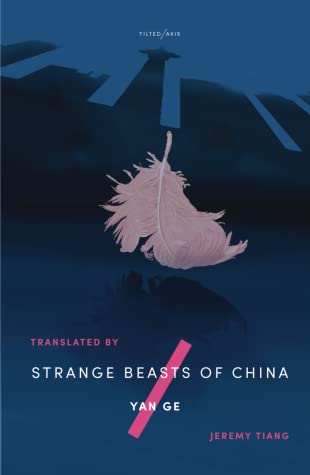- The Good: A chronicle of beasts to make you question your own humanity
- The Bad: I want more internal character motivation to support the arc
- The Literary: Written as a bestiary with hints of fable and folklore
In the fictional modern industrialist Chinese city of Yong’an, an unnamed protagonist hangs out and drinks too much at the Dolphin Bar, lamenting her the loss of her former studies as a cryptozoologist, which she quit because of her professor. She’s still fascinated with the strange beasts that live alongside humans and tracks down each breed in turn at the behest of her editor, chronicling her encounters and discoveries for newspaper publication.
Structured as a bestiary, each chapter focuses on one beast at a time. To modern eyes, the collection reads like a series of loosely connected, chronologically-ordered short stories. Typically, each chapter begin with a general description of the beast in question, followed by the narrator’s anecdotal and often personal experiences, and ends with a reveal, sometimes a twist about what the beast is really like. But it’s the protagonist that holds the book together, and as the stories proceed, her story gains weight as she finds clues to her own past.
Beasts walk among the humans, but most have not successfully intermingled into society, preferring to stay with their own kind. Some are so rare they’ve never been seen, but all are spectacles of human amusement. Female sorrowful beasts are beautiful creatures, so sought after by rich elites who pay the government large sums of money for a regulated marriage license. The short and ugly Impasse beasts happily work long hours and hard labor so they can afford to buy almost-rotten food, considering themselves lucky because they have enough to eat.
The prose is straightforward, and the dispassionate description of the fantastic beasts is always followed by the phrase, “other than that, they were just like human beings.” The narrator’s deceased mother imparts her wisdom often, sometimes multiple times each chapter, including, “My mother used to tell me, ‘You can’t be sure that beasts aren’t people, or that people aren’t just another type of beast'” or “My mother used to say: never cry, or your tears will water your sorrow and it’ll grow.”
The tone is quiet, dark, almost noir. The protagonist is a young and reckless soul, frequenting the same bar to get drunk where she’s mostly left alone. Over the course of the book, she becomes more and more personally invested in her work. She’s beat up in dark alleyways; she loses people; and she almost loses herself. But the book is also surreal and dreamlike, from the physical differences of the beasts—gills and scales and elongated necks—to the twists and turns of who is exploiting whom. It’s all so unexpected, and I love reading something I can’t predict.
All great scifi and fantasy uses genre to turn a lens back on ourselves, and this is a skillful exploration of complex ideas about identity and who we consider to be different from ourselves. But it’s not a simple as you might think. Many of the beasts are violent or immoral, and it’s not as clear cut whether the fear and ostracism is warranted. Even the noble beasts intentions are misunderstood or secretly horrifying, which forces the reader to evaluate the worst aspects of our own humanity.
Although I’m sure I’m missing a great deal of the subtleties of modern-day China, the critique also does not shy away from social inequality, environmental and biological destruction, economic disparities, and government control. And the public in the book has no sense of place or history, and their collective memory loses hold of recent atrocities.
Something about the collection seems unpolished or unfinished, including a few grammatical errors. Perhaps its the translation, or perhaps the distant perspective or the lack of inner thoughts and character motivations. But even so, The Strange Beasts of China is something special, romantic and melancholy, disquieting and rebellious, that facilitates late night readings and lingering thoughts well past the epilogue.
Highly recommended for anyone looking for a new reading experience! Thanks to Netgalley and Melville House Publishing for a free copy in exchange for an honest review!
